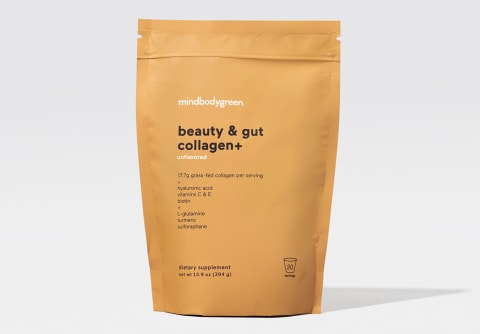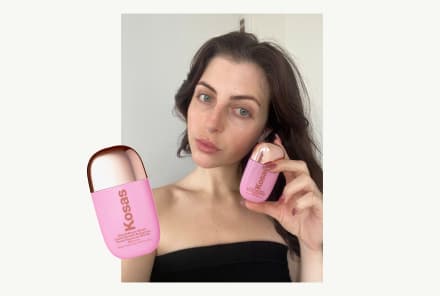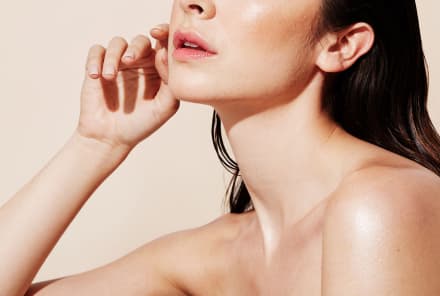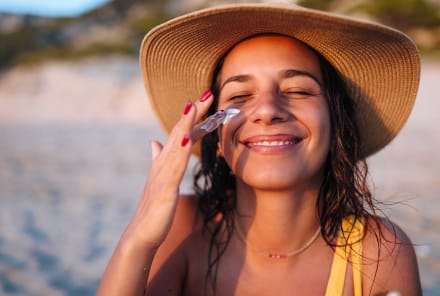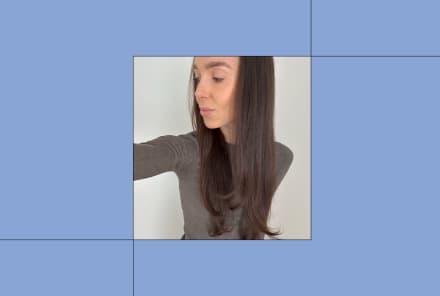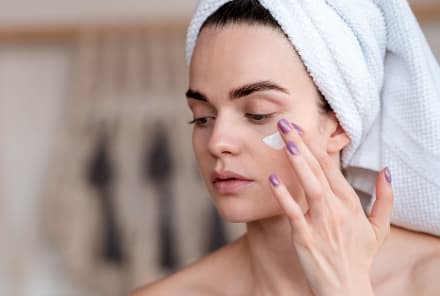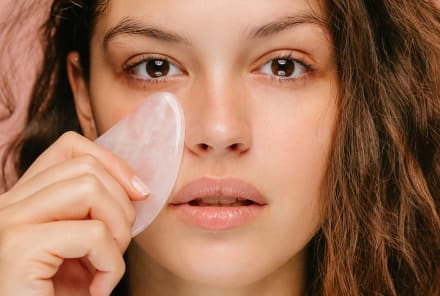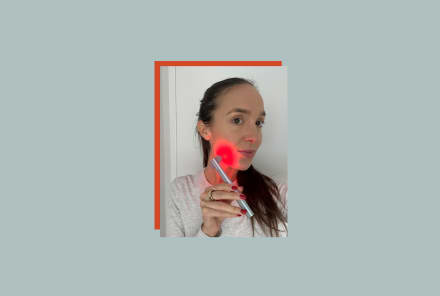Advertisement
Collagen For Hair: 4 Benefits & How To Look For A Hair Supplement*


Ashley Jordan Ferira, Ph.D., RDN is Vice President of Scientific Affairs at mindbodygreen. She received her bachelor's degree in Biological Basis of Behavior from the University of Pennsylvania and Ph.D. in Foods and Nutrition from the University of Georgia.
Collagen is often touted to reduce signs of aging, plump up skin, and add a youthful glow to our complexions.*
Since collagen is the body's most abundant protein and found in connective tissues, joints, and skin, we'd say it's a pretty big deal.*
In addition to the many full-body benefits that often get brought up when discussing collagen supplements, hair health is a common claim as well.*
But what exactly does collagen supplementation do for your mane? After all, hair is made of the protein keratin—not collagen.
Well, we tapped some top experts to get the scoop on collagen and hair health including what collagen does for the hair, what to look for in a hair supplement, and whether it can, in fact, help with hair growth.*
Keep reading to learn more.
Science-backed benefits of collagen for hair
As the body of research grows in the world of collagen supplementation, we become more comfortable explaining the benefits of the peptides.
There's pretty substantial evidence in connection with the skin and joints, and increasing studies about bone, muscles, and gut health.*
However, one area of research that's not as vast is hair health. (It's just not a top priority for researchers at the moment, but that doesn't mean that down the line there won't be more.)
That being said: We found four potential benefits collagen has on hair, including reducing hair shedding and a balanced scalp.* More on this below.
Provides essential compounds for hair growth
"Collagen is not a component of hair," says Rachel Maiman, M.D., board-certified dermatologist at Marmur Medical. "But the main component of hair, about 95% of it, is the protein keratin." In order for the body to make keratin, amino acids (or building blocks of protein) are necessary. And that's where collagen comes into play.*
Certified trichologist and founder of Advanced Trichology William Gaunitz, FWTS, says the primary amino acid that is most helpful is called proline1.
It's a physical component of keratin and affects new hair growth. So, in short, collagen peptides that contain proline can help create the protein that makes hair and supports growth.*
mbg's vice president of scientific affairs Ashley Jordan Ferira, Ph.D., RDN, provides this pragmatic tip: "Check out the collagen brand's amino acid profile to see the breakdown of these protein building blocks with more transparency. This will inform proline percentage and all the other amino acid contributions too."
Summary
Supports hair follicle health and regeneration
According to Maiman, several studies have found that during the hair's growth phase (known as anagen), the collagen levels surrounding the hair bulb actually thicken and increase.
And as the hair follicle goes into the catagen stage, it sheds two layers of collagen encompassing it.
"As our bodies create more collagen, the layers regenerate. This supports our hair follicles by assisting them in re-entering the anagen phase and maintaining the hair growth cycle,"* she says.
Gaunitz also adds that the consumption of collagen allows the body to have a greater number of available amino acids, which can help strengthen the protection of hair follicles from oxidation.* This, in turn, will improve the productivity of the hair follicle.*
Summary
It may help with graying
Collagen may also help reduce the number of gray hairs that appear on your head, according to board-certified dermatologist Hadley King, M.D.
"It's full of antioxidant properties that can help neutralize free radicals2 from UV rays and pollution,"* she says. "It is also theorized that collagen may help protect hair follicles and decrease graying of hair as well."*
More research to aid this theory: One study found that free radical accumulation in the hair can manifest in loss of color3, or hair graying.
Hair graying is, of course, a natural part of the aging process, but this loss of pigment speeds up in correlation to the amount of oxidative stress the hair follicle is exposed to.
However, this is just a theory at this point. No study has confirmed this at this time.
Summary
May help maintain a healthy scalp
Just like the presence of collagen improves the health of our complexions, this protein is beneficial for the scalp, too: "Collagen supports the scalp's thickness,"* Maiman says. "A thin scalp with insufficient collagen is less robust and less capable of holding the hair follicle bulbs in place."*
She continues that this suboptimal structural support may contribute to hair loss. And since a healthy scalp is the foundation for healthy hair and hair growth, we consider collagen a major factor when it comes to scalp health.*
Summary
What else should you look for in a hair supplement?
Collagen is by no means the only hair nutrient or supplement to look for. In the same way that skin requires a wide variety of nutrients to look and feel its best, your hair does too.
We recommend making sure you get a robust amount of nutrients in your diet—from food and supplementation—in order to optimize your results.
So, here are a few other recommendations:
- Silica: Silicon supplements have been shown4 to promote hair strength, brightness, and thickness and decrease hair breakage.* While the mechanism isn't entirely understood, some believe that it helps with keratin production.*
- Vitamin E: Vitamin E can do wonders for your hair when applied topically—and taken internally.* Vitamin E is believed to work via anti-inflammatory properties on your skin and scalp5, slowing free radical damage around your hair follicles that can lead to premature graying and hair breakage and loss.*
- Omega-3s: Omega-3 fatty acids are healthy fats that can do loads for your overall health.* Some research suggests6 that omega-3 fatty acids can support your skin and hair health when they're taken along with other antioxidant supplements.*
- Iron: While we don't know exactly how iron affects hair growth specifically, we do know that without the proper iron intake, hair follicles do not function properly7.* However, iron supplementation isn't for everyone. Be sure to talk with your medical practitioner prior to starting a routine.
- Vitamin C: Vitamin C can help hair in a few ways. The first is that it supports collagen production, which is important for the scalp.* The second is that it reduces free radical accumulation.* And the third is that it aids the body in absorbing iron8, which we also know is beneficial for hair growth.*
Summary
RELATED STORY: 9 Best Products For Thinning Hair Of 2023, Tried & Tested
Is biotin or collagen better for hair?
There seem to be two competing camps in the hair supplement world: collagen and biotin. Unfortunately, the jury is still out on this one.
Most experts agree that there isn't enough research to prove one is better than the other when it comes to the hair. Collagen helps hair in the ways we suggested above, and biotin is thought to support healthy hair growth because it is involved in the production of keratin9.*
Ferira shares that, "the collagen-versus-biotin competitive sentiment is invented by humans. In reality, this protein and water-soluble vitamin are not going head to head. They each deliver unique health functions relevant to the beauty realm."
So certainly, you can try both, since biotin and collagen come with a load of beauty benefits including improving skin, nail, and hair health.*
Summary
RELATED STORY: Biotin & Collagen: How These Supplements Work Together
The takeaway
There's still a lot of research to be done on the effects of collagen and hair health, but what we do know is that amino acids are needed in the body to produce a healthy mane.*
And one way you can get those amino acid peptides is through collagen supplementation.* If you are looking for a new option, check out our favorite collagen supplements here.
10 Sources
- https://www.ncbi.nlm.nih.gov/pmc/articles/PMC8569898/
- https://pubmed.ncbi.nlm.nih.gov/26574302/
- https://www.ncbi.nlm.nih.gov/pmc/articles/PMC2929555/
- https://www.ncbi.nlm.nih.gov/pmc/articles/PMC4938278/
- https://www.ncbi.nlm.nih.gov/pmc/articles/PMC3819075/
- https://www.ncbi.nlm.nih.gov/pubmed/25573272
- https://www.ncbi.nlm.nih.gov/pmc/articles/PMC3678013/
- https://www.ncbi.nlm.nih.gov/books/NBK499877/
- https://www.ncbi.nlm.nih.gov/pmc/articles/PMC5582478/
- https://www.ncbi.nlm.nih.gov/pmc/articles/PMC5579659/
Watch Next
Enjoy some of our favorite clips from classes
Enjoy some of our favorite clips from classes
What Is Meditation?
Mindfulness/Spirituality | Light Watkins
Box Breathing
Mindfulness/Spirituality | Gwen Dittmar
What Breathwork Can Address
Mindfulness/Spirituality | Gwen Dittmar
The 8 Limbs of Yoga - What is Asana?
Yoga | Caley Alyssa
Two Standing Postures to Open Up Tight Hips
Yoga | Caley Alyssa
How Plants Can Optimize Athletic Performance
Nutrition | Rich Roll
What to Eat Before a Workout
Nutrition | Rich Roll
How Ayurveda Helps Us Navigate Modern Life
Nutrition | Sahara Rose
Messages About Love & Relationships
Love & Relationships | Esther Perel
Love Languages
Love & Relationships | Esther Perel
